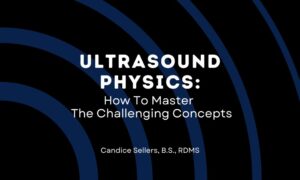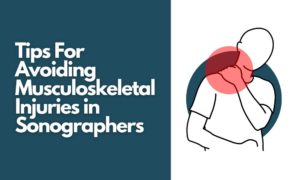Sandra Minck, RDMS has been a Registered Diagnostic Medical Sonographer (RDMS) for nearly 29 years. She was inspired to start her ultrasound career after seeing that first sonogram while pregnant with her first child. Now a mother of two, Minck is also the author of Ultrasound Unwrapped: A Week-by-Week Pregnancy Image Guide, where she provides a wealth of information on OB/GYN ultrasound and answers questions asked by expectant mothers and other patients.
Minck took the time to chat with us, revealing how she has evolved in her career, the rewards and challenges and some valuable advice for aspiring sonographers and ultrasound technologists, as well as for women who are pregnant for the first time.
I didn’t really know what direction I wanted to take professionally but knew I wanted to continue my education and became enthralled with my first sonogram. I had always been fascinated with the physiology of the human body so I did some research and found there was a program locally. I began my career in ultrasound when my first child was a year old.
I had been a student of about three years at a university when I decided to pursue ultrasound training and had absolutely no clue about what I was delving into or how much it would challenge me both emotionally and professionally. I had earned enough credits to begin the 6-month program which was extended to one year some years back; I felt a longer training period was definitely necessary.
I started off in a hospital setting where I worked with about seven other sonographers in a large radiology department. We did everything but Echo and Peds. The first six months there was the hardest thing I’ve ever done in my life.
Learning how all the radiologic pieces correlated with ultrasound, labs and prior exams to complete the patient case puzzle was a daunting task with no prior medical background. I questioned many times whether it was the right decision for me but glad I persevered.
If we talk about changes in my profession, we can go back to the early days when we still developed film in a dark room! Back then, there was no hard drive so if the power flickered or you accidentally hit the new patient button, all was lost.
I’ve seen the inception of 3D and then 4D imaging and how that has evolved over the past 15 years. Power Doppler, Cineloop, implementing an archive system and post-processing editing abilities are incredible perks that did not always exist. I could never work without them now! Resolution on current equipment has become phenomenal and so important in the characterization of pathology.
If we discuss how my career has developed, I spent about 9 years at the hospital mentioned above. I learned so much there; it was the best education that could never be replaced, thanks in part to a couple of really great radiologists who pushed and challenged me.
From there I worked part-time in an imaging center, a couple of OB/GYN private practices and another two-year stint in another hospital. I’ve worked exclusively for about 13 years now with my current employer, a group of fabulous OB/GYN docs in a private practice.
Yes, I specialize in OB/GYN sonography and spend my days performing pelvic scans, mostly Transvaginal, for all diagnostic reasons, Saline Infusion Sonography, physician-assisted amniocentesis and fetal scans at every gestational age.
My schedule is set up so that I have a patient every 30 minutes. Patient flow waxes and wanes depending on the time of year. I have a lot of autonomy with regard to my schedule, adding patients where I need or having them reschedule if they show up too late with no place else to accommodate them that day. No call, no holidays! But, I also paid my dues early on with many years of that.
I have a great relationship with my docs. You have to. You have to feel comfortable and confident in your skills and be able to provide a valid explanation for what you see and how you report it. This does not come overnight! But over time…
You’re asking me to go back to the Dark Ages on this one. I can’t remember what I did last week. I do remember dedicating many long hours to memorization.
Back then, I really had such limited experience that it was difficult to answer some of the questions on the Specialty examination. When so much of what you do and see is repetitive, you can call on your clinical and scanning experience to answer some of them. I thought I surely failed Physics and was astounded when I received passing results.
I took Abdomen/Small Parts first in 1992 since that was what I did most. In 1995, I took and passed OB/GYN. In 1999, I passed the Vascular Technology exam but failed the Vascular Physics portion by 1 point! I was doing a lot of vascular grafts, etc. at the time but right after the test, got my opportunity to work for the OB practice.
My understanding is that the examination has become quite a bit harder, especially the Physics portion including all the directional and color flow questioning…very challenging for a new sonographer.

The impact you make on someone’s life and the relationship I have with some of my patients. It’s rewarding when they appreciate the work I’ve done for them and they take the time to tell me so.
It’s about making a positive difference in each and every patient. Also, the ability to share the experience of witnessing the heartbeat of a couple’s child for the first time is a blessing and a special experience.
In the beginning, it was putting all the puzzle pieces together so that it made sense. The first few months felt like a fog that slowly lifted over time.
Today, it’s continuing to want to work in a clinical environment despite the sometimes thankless and demanding patients with an entitled mentality. You can’t please everyone. I find it usually takes just one really appreciative patient to turn that around.
Fortunately, I have more of the latter. The incorporation of EMR (electronic medical record) has made me less productive and there really isn’t a way to improve that currently. It’s a time-demanding requirement.
WWAVB was delivered (pun intended!) March of 2012. I couldn’t find details on a particular disease process in my reference at work so I did a web search hoping to find some medical article to enlighten me. Instead, I was overwhelmed with the incredible amount of trash available to the general public regarding ultrasound information.
Forum after forum and blogs written by lay people with absolutely zero medical knowledge, obvious because of their many improper uses of medical terminology. I was so angry that people could put out such garbage to the unsuspecting and believing public.
I’ve spent so many years in the field and have been asked the same questions over and over. I know people have a genuine curiosity and interest in ultrasound. I thought that if I put true and accurate information out there, it just might reach someone, or many.
It’s an incredible experience to see your child for the first time; it’s an honor to share that experience with you as a sonographer.

The best advice I can give anyone expecting is to NEVER listen to anyone else’s advice! Your doctor is your guide, your expert and your counselor for whatever pregnancy-related questions you have…not your mother, not your best friend who just had a baby.
ONLY your doctor’s advice matters. Also, no matter how much you want to find out, 15wks is TOO EARLY to determine gender so, PLEASE, stay away from those free-standing 3D cash cows who only want to take your money. Your doctor and staff should be the only people laying hands on your belly and fetus.
Yes! I’d love to add a message for sonographers, especially those who are new to the field. A quality exam is important! Your thoroughness, accuracy and attention to detail can determine whether your patient goes to surgery or goes home, only for a Stage 4 process to be found six months later because you only did a quasi-sweep of the RT adnexa.
Ultrasound, being the most operator-dependent modality, requires great experience. I recommend all newly-certified sonographers work in a busy hospital where education and supervision are emphasized.
You should NOT try to work in a clinical setting alone right out of training! It will take time for you to recognize pathology on your own. You WILL miss things and it will be a disservice to your patients.
I cannot emphasize this enough. Ask questions of your supervisors and physicians. Ask for supervision while scanning. Look up answers. Become informed. Details matter. Talk to your patients and listen.
It’s important they feel you care about why they are seeing you. Don’t just be a good sonographer, be a great one. Your patients deserve it.
Good luck in your ultrasound career where education and the opportunities to learn are endless. We never know it all so keep challenging yourself!
If you’d like to learn more about opportunities in sonography, check out some of our other inspiring interviews:
- Traveling Sonographer – Interview with Dave Felix, traveling sonographer and owner of SonoTemps
- An Interview With Sonographer Dr. Traci Fox EdD, RT(R), RDMS, RVT
- Program Director Tricia Turner (BS, RDMS, RVT) Shares Her Passion for Sonography!







